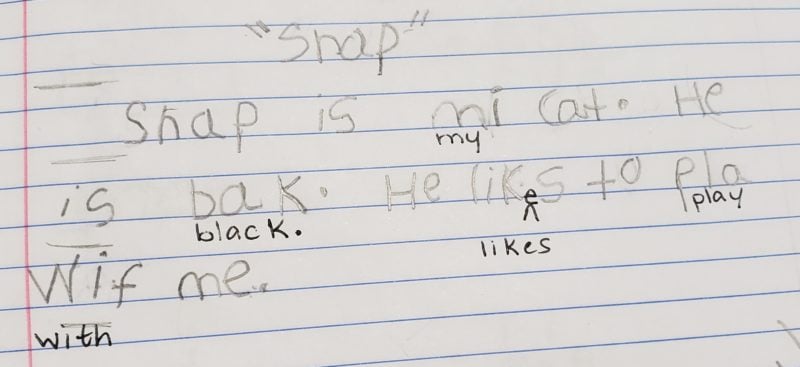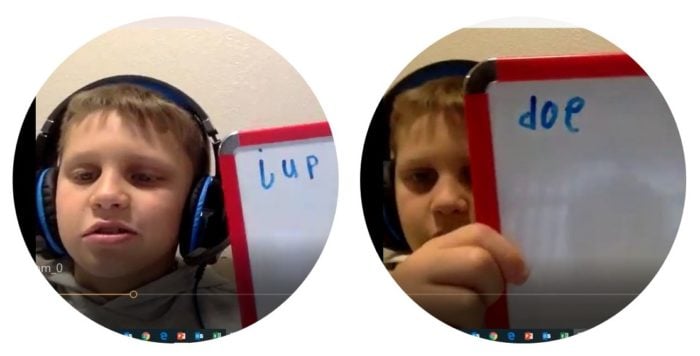
Ten-year-old Dalton has been diagnosed with dyslexia and developmental coordination disorder (dyspraxia) at Texas Scottish Rite Hospital for Children and with dyslexia and dysgraphia by a multidisciplinary team at his school. Despite occupational therapy, speech therapy, physical therapy, and putting three Orton-Gillingham-based programs to the test, he continued to struggle.
Dalton becomes an Edublox student
Like all pharmaceuticals, Edublox intervention programs get tested before they get implemented. Dalton became a trial student to help develop our live online tutoring programs for dyslexia and dysgraphia. Edublox’s Live Tutor consists of two components: (1.) cognitive development through Development Tutor and (2.) live online tutoring.
Dalton’s progress summarized
Dalton was basically a non-reader. Here is a video of him trying to read the ten sight words known to him:
.
.Dalton began the recommended Edublox program on October 31, 2018. After taking time off in December, he did his final free live tutoring session on March 10, 2019.
His mom summarized the progress made after the first month:
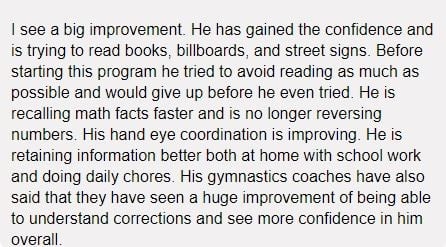
His mom summarized the progress made after the three months trial:
Dalton has also improved in his reading, so much so that he has gained confidence to read in front of his friends. He has never had the confidence – or ability – to do this before.
Before Edublox, I tried multiple Orton-Gillingham programs with Dalton. The programs base their teaching on phonemic awareness and learning phonics. It did not matter how hard we worked, how many tears fell, he would get halfway through learning a section and he would immediately forget what he had learned. I drilled him; we repeated everything over and over again, but nothing stuck.
Edublox is completely different. Dalton now retains what he has learned, because the Edublox program has improved his memory. As he progresses to higher levels on the cognitive exercises, he is motivated to work even harder. He is also finally starting to see the patterns in the logic exercise, which has been a real challenge before. Edublox has also helped for his auditory processing disorder and other processing problems. He is less stressed and can work for longer periods. For Dalton, Edublox is life-changing!
A comprehensive version of Dalton’s journey
- Dalton’s story, as told by his mom
- Dalton’s assessment results (he was assessed twice)
- Progress updates.
Dalton’s story, as told by his mom
.
Dalton started public school in preschool and remained there until the middle of second grade. He struggled from the very beginning, but his struggles were clearly visible once he entered kindergarten. He couldn’t remember letters, sounds, numbers, write his own name, and wasn’t learning sight words like he should. We also started noticing severe anxiety issues and he hated going to school. He started telling us he was stupid and dumb.
In April of his kindergarten year we got a call from the school and we found out Dalton’s teacher was calling him and other kids in the class ‘stupid’. A fellow teacher reported her behavior, and according to the counselor his anxiety was caused by this teacher’s actions. Even with all that happening, the school wanted to retain him, but I refused. I had already learned from past experience with Dalton’s older sister that retention does not help solve a learning disability or dyslexia.
Dalton continued to struggle in first grade with reading, writing, and math, so I requested to have him tested for dyslexia and other learning disorders at Texas Scottish Rite Hospital. They diagnosed him with a speech-sound (articulation) disorder, dyslexia, at risk for dyscalculia, and developmental coordination disorder (his fine motor development was severely delayed); and told us that he needed occupational therapy for core strength issues. He immediately started occupational therapy, speech therapy, and with a tutor using an Orton-Gillingham-based program. Dalton, however, continued to struggle with basic sight words, letter reversals, handwriting, sounding out CVC words, and had no fluency.
In first grade Dalton had a wonderful teacher who tried to help fight to get services for him through the school. However, since he wasn’t in second grade they refused to start dyslexia services or any other interventions, other than what was being offered in the classroom.
In March of his first-grade year Dalton was assessed again, this time by a multidisciplinary team at his school. They confirmed the diagnoses of dyslexia (specific learning disability in basic reading skills and reading fluency) and speech impairment (articulation delays), and also diagnosed him with dysgraphia (specific learning disability in written expression).
We moved before Dalton started second grade. The school district we moved to refused to start dyslexia services or any other services until after the first semester, so I pulled him out to homeschool him. I thought he would be like my daughter and we could continue an Orton-Gillingham-based program and see real improvement. I found a well-known program that I could teach at home. Since he had improved a little bit before while being tutored only once a week, I figured that he would improve quickly if we would work on it daily. Well, after a year, I realized this program was not helping but frustrating him. We tried another OG-based curriculum with the same result. The only real improvement we saw was with his math skills and with his anxiety, which was getting less.
Dalton continued to struggle in third, and now in fourth grade, and is falling further and further behind in reading and writing. He only has about 10 sight words and those are not consistently. He struggles daily with remembering the days of the week and months of the year, and confuses morning and evening. He even struggles to remember when he should go to gymnastics, where he trains a total of 4 hours a day, 5 days a week. He is frustrated and wants to read so badly, and he is scared that he is never going to learn how.
I found Edublox in a desperate search for other options, and after reading Maddie’s story I was in tears. This was the first time I felt like I had real hope to help my son. Dalton and Maddie have so much in common with their reading, writing, and math issues. I showed Dalton the video of Maddie reading before starting Edublox, and he said, “mom she reads just like me.” When I showed him her video after only three weeks of Edublox he started to cry, and said he wanted to learn to read like she did. As we get ready to start Edublox this is the first time Dalton and I both have real hope.
Stephanie
Dalton’s mom
***********
Dalton attempting to read the ten sight words known to him:
.
.
Stephanie also submitted examples of Dalton’s writings:
.
.
Below he had to “Write 3 sentences about sharks”:
.
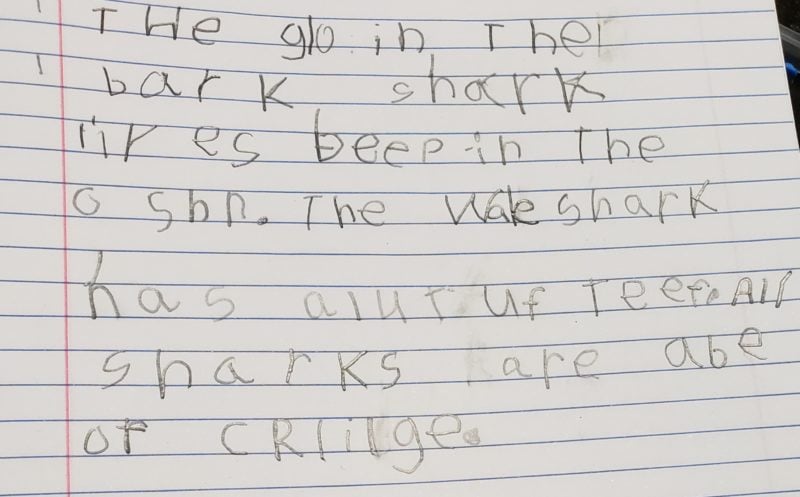
The glow-in-the-dark shark lives deep in the ocean. The whale shark has a lot of teeth. All sharks are made of cartilage.
.
Dalton writing the ten digits:
.

.
Dalton’s assessment results
.
Dalton was assessed twice: first at Texas Scottish Rite Hospital for Children at the beginning of 1st grade, and again at his school by a multidisciplinary team in March of 2016.
Texas Scottish Rite Hospital for Children
The report from the hospital confirmed that Dalton “was delayed in achieving early developmental milestones in oral language. He participated in speech therapy, occupational therapy and physical therapy through a private facility from 2 to 4 years of age with emphasis on oral development and fine motor skills. Dalton has been receiving reading intervention through the school since kindergarten. He currently receives additional reading support four times per week. He also receives support from his classroom teacher as needed.
“The ANSER System School Questionnaire was used to obtain educator perceptions of Dalton’s strengths and weaknesses in the academic environment. The questionnaire was completed on December 13, 2015 by his first grade teacher. Dalton is experiencing difficulties with reading, writing, spelling and math reasoning. He displays strengths in attitude, compassion and effort. He performs significantly below the level expected for age in decoding skills, sight word recognition, oral reading accuracy, reading fluency, reading comprehension, handwriting, copying skills, spelling and written expression. In the area of math, delays are noted in his ability to learn math symbols, learn math facts, learn new procedures, perform computations, solve word problems, acquire math vocabulary, and understand explanations about math. Dalton demonstrates the ability to understand verbal directions and stories read to him but displays difficulty with following multistep instructions, remembering skills over time, learning new vocabulary, pronouncing new words, speaking intelligibly, constructing good spoken sentences, explaining, summarizing and elaborating on his thoughts verbally. He does not always apply effective strategies for problem-solving. At this time, the teacher is primarily concerned about his reading skills. He does not display complicating factors related to behavior and attention. The teacher is requesting more information about how to support him in the areas of phonemic awareness, reading and math.”
A battery of tests was administered; the results of the most important are below. To understand the results one needs to know the meaning of “standard scores”. Standard scores are used to compare the child’s performance to children of the same age. Generally, standard scores that fall between 90 and 109 represent the “average” range. Approximately 50% of the children will have scores within the “average” range.
> 130: Very Superior
120-129: Superior
110-119: High Average
90-109: Average
80-89: Low Average
70-79: Borderline
69 and below: Extremely Low
Wechsler Abbreviated Scale of Intelligence – Second edition (WASI-II) Standard Score
Verbal Comprehension Index: 101 (Average)
Perceptual Reasoning Index: 97 (Average)
Full Scale IQ: 99 (Average)
Wechsler Individual Achievement Test – Third edition (WIAT-3)
Word Reading: 70 (Borderline)
Spelling: 82 (Low Average)
Numerical Operations: 91 (Average)
Math Problem Solving: 86 (Low Average)
Comprehensive Test of Phonological Processing (CTOPP-2)
Phonological Awareness Composite: 77 (Borderline)
Rapid Symbolic Naming Composite: 88 (Low Average)
Phonological Awareness Test 2 (PAT-2)
Decoding: 87 (Low Average)
Woodcock-Johnson IV
Writing samples: 80 (Low Average)
Beery Buktenica Development Test of Visual-Motor Integration
Visual-Motor Integration: 96 (Average)
Visual Perception: 93 (Average)
Motor Coordination: 55 (Extremely Low)
Dalton was diagnosed with
- Speech Sound (articulation) Disorder
- Oral Language Disorder, tentative, pending diagnostic evaluation
- Dyslexia
- At Risk, Mathematics Disorder
- Developmental Coordination Disorder
.
School assessment
A multidisciplinary team at Dalton’s school confirmed the diagnoses of dyslexia (specific learning disability in basic reading skills and reading fluency) and speech impairment (articulation delays), and diagnosed him with dysgraphia (specific learning disability in written expression), contrary to the diagnosis of developmental coordination disorder (dyspraxia) that he received at Texas Scottish Rite Hospital. Dyspraxia generally impacts both gross and fine motor skills, and dysgraphia only fine motor skills. We believe the many hours of gymnastics practice has erased any gross motor problems Dalton might have had, as the team considered gross motor skills to be a strength (see below). We have thus accepted the school’s diagnosis of dysgraphia, rather than dyspraxia:
.

.
Progress updates
.
November 30, 2018. Dalton’s tutor wrote:
I began tutoring Dalton on October 31, 2018 – a friendly young boy, one who is willing to learn but one who clearly struggles to do so. I have tutored many students with dyslexia over the last three decades. At the start of tutoring, most of them can sound out CVC words and read CVC words after sounding them out. Dalton was unable to sound out CVC words — even “cat” and “dog.” He struggled with auditory processing, frequently reversed letters and words, and his memory — both short- and long-term — was extremely poor.
Lesson 3 was a great session. When we ended, Dalton was able to read 18 words, which seemed promising and already an improvement over him reading on the video recorded only a few days before.
As more words were added, Dalton’s ability to process new words slowed down, and I started drilling the basic sounds using 3- and 4-letter words. By the end of November, I was able to introduce spelling patterns, for example, if you can spell “nest” you can also spell “west,” “best,” “test,” “vest,” and “rest.”
After Lesson 3, Stephanie sent this message via Facebook:
.

.
On the same day, she also had some sad news:
.

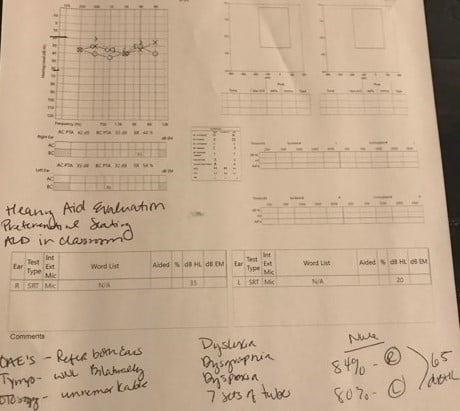
.
Dalton had a ton of ear infections growing up, Stephanie explained, and was fitted with ear tubes (grommets) several times. A few doctors told Dalton’s parents that he needed hearing aids, but a pediatric audiologist said his hearing wasn’t poor enough for hearing aids. The assessment that was done by his school in March 2016 also indicated that his hearing skills were adequate.
The multiple ear infections explain Dalton’s auditory processing challenges, as well as his articulation problems.
Dalton will receive hearing aids in 2019.
Reversals
As mentioned, Dalton reversed letters: not only the typical b-d and p-q, but also g, j, and n. During Lesson 3, Dalton had to write “jump” and “dog”:
.

.
Both “mug” and “gum” are part of his reading pile, which he continually reversed for the first three weeks. By the end of November, however, there were hardly any reversals in his reading and spelling. The images below are from Lessons 17 and 18:
.
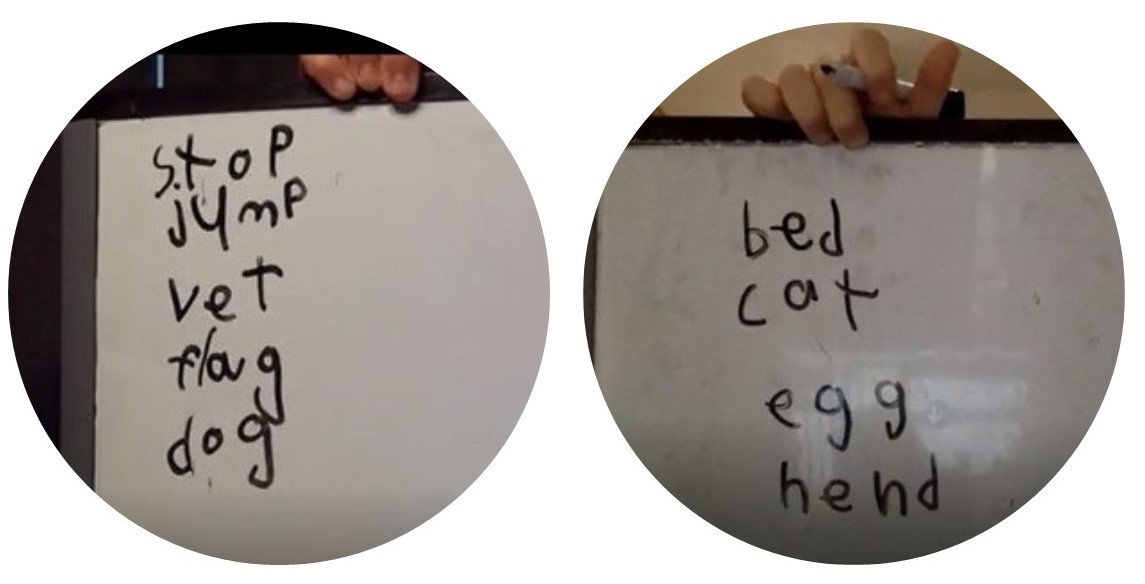
.
Progress in reading and spelling hinges on improved cognitive skills. Below is Dalton’s Development Tutor progress bar by the end of November:
.
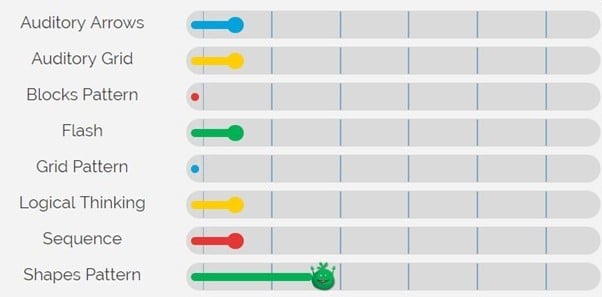
.
On November 30 (after Lesson 23), I asked Stephanie if she was seeing progress on her side, and she replied:
.

.
A video of Dalton doing gymnastics:
.
.
.
February 1, 2019. Dalton’s mom wrote:
We took some time off in December because Dalton was sick and our Edublox tutor on vacation, but on January 2 we were back on schedule.
Since starting Edublox Online Tutor and live tutoring with in November, Dalton is now trying to read or having me read to him multiple times a day. Before he didn’t even want me to read to him because he had problems remembering what I had read, and zoned out while I was reading, so books were boring and not fun or interesting. Right now, we are reading The 39 Clues series together and he is able to keep up with the adventures and clues better than I am.
Dalton also decided that he wanted to practice some sight words that he couldn’t do before to surprise his tutor with how much he has learned. We had spent countless hours on these same sight words for years with little progress. After practicing them over 5 days he only missed 4 of the 58 sight words! In math, he is now able to do addition and subtraction, and even multiplication problems quickly. I am amazed at how far he has come in such a short time.
Dalton and I recently started having text conversations. He has never even tried to read the text before. For the most part I use words that he can sound out or already read, but there are always a few where he has to use context clues to figure them out.
I finally got everything cleared from my schedule, so that I can spend more time working with Dalton. Last semester I had night classes 5 days a week, but now I have only 2 so we plan to put in an extra 45 minutes or so every day and hope to see even faster progress than we have seen so far.
Dalton will also have his hearing aids either this week or next week, and I know from experience that he is going to have a whole new world of sound opening up to him.
.
******
.
Dalton’s Development Tutor progress bar after 67 sessions:
.
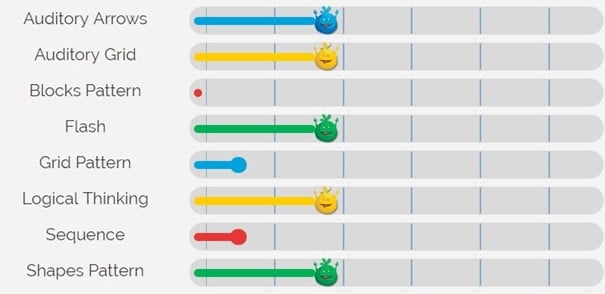
.
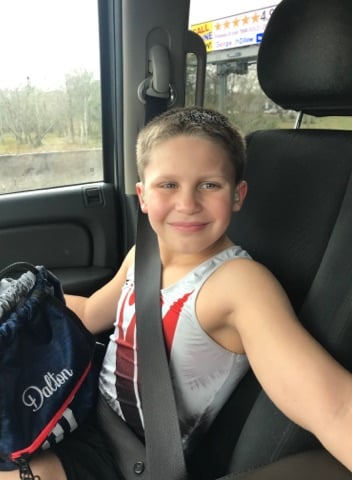 .
.
March 10, 2019. Dalton’s mom wrote:
Dalton is starting to adjust to his new hearing aids. I have been told my family, friends, and coaches how much of a difference they have seen in his personality. He is more talkative and outgoing, and is also answering questions in detail, not just giving one- or two-word responses.
Dalton has also improved in his reading, so much so that he has gained confidence to read in front of his friends. He has never had the confidence – or ability – to do this before.
Before Edublox, I tried multiple Orton-Gillingham programs with Dalton. The programs base their teaching on phonemic awareness and learning phonics. It did not matter how hard we worked, how many tears fell, he would get halfway through learning a section and he would immediately forget what he had learned. I drilled him; we repeated everything over and over again, but nothing stuck.
Edublox is completely different. Dalton now retains what he has learned, because the Edublox program has improved his memory. As he progresses to higher levels on the cognitive exercises, he is motivated to work even harder. He is also finally starting to see the patterns in the logic exercise, which has been a real challenge before. Edublox has also helped for his auditory processing disorder and other processing problems. He is less stressed and can work for longer periods. For Dalton, Edublox is life-changing!
.
******
.
Dalton’s Development Tutor progress bar:
.
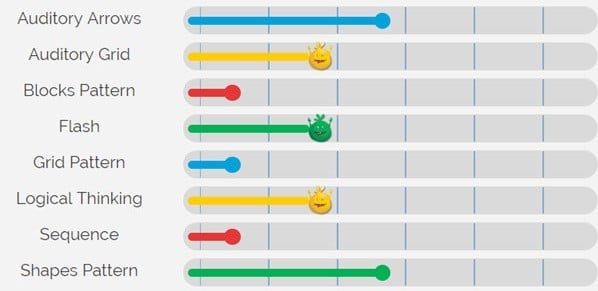
Edublox offers live online tutoring to students with dyslexia and dysgraphia. Our students are in the United States, Canada, Australia, and elsewhere. Book a free consultation to discuss your child’s learning needs.


